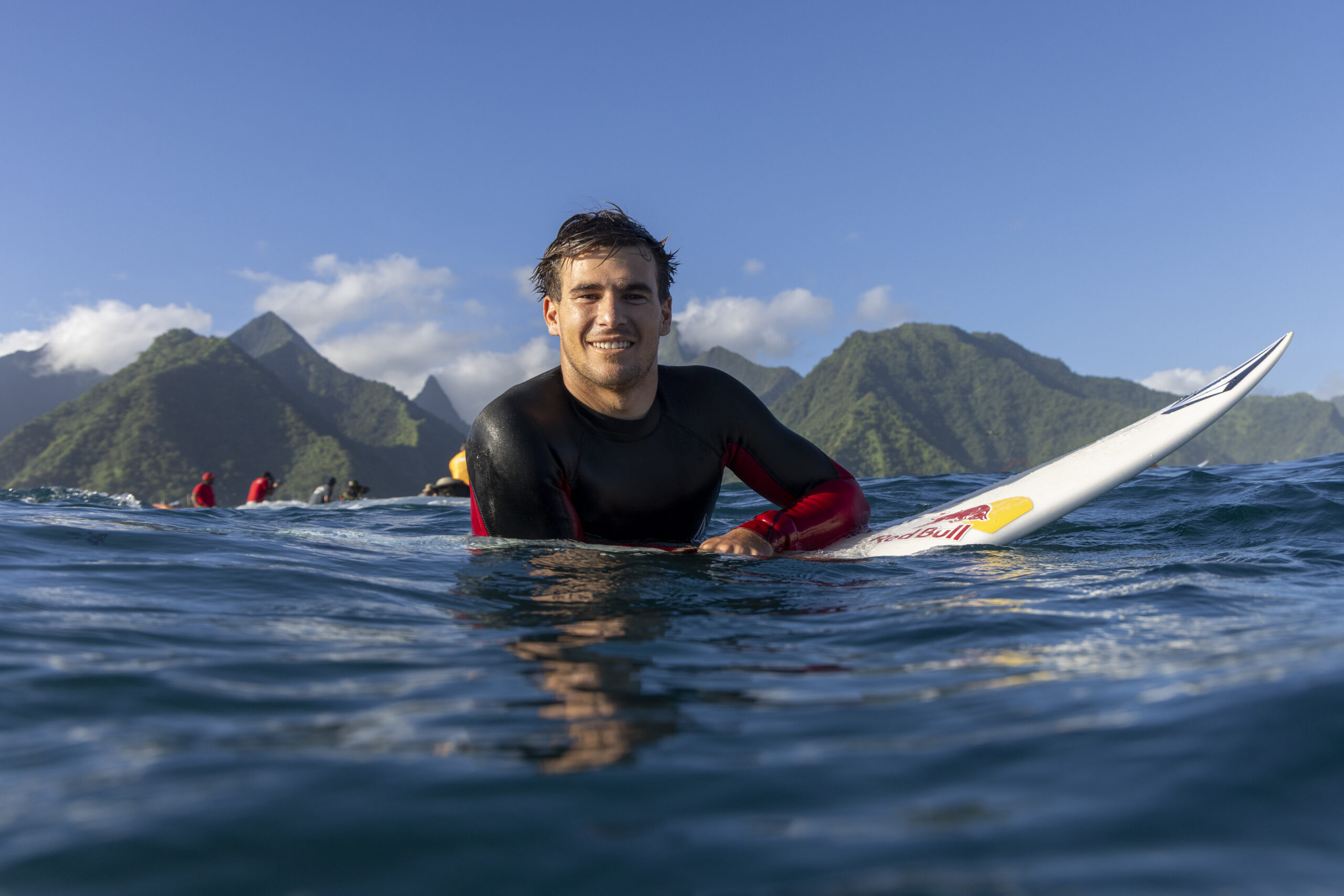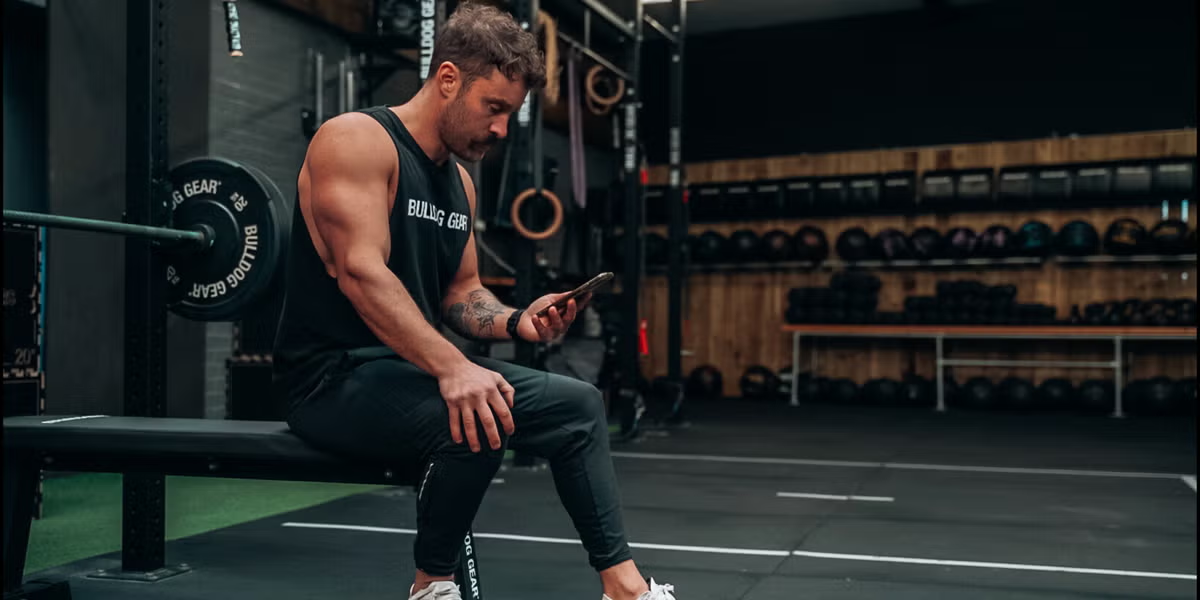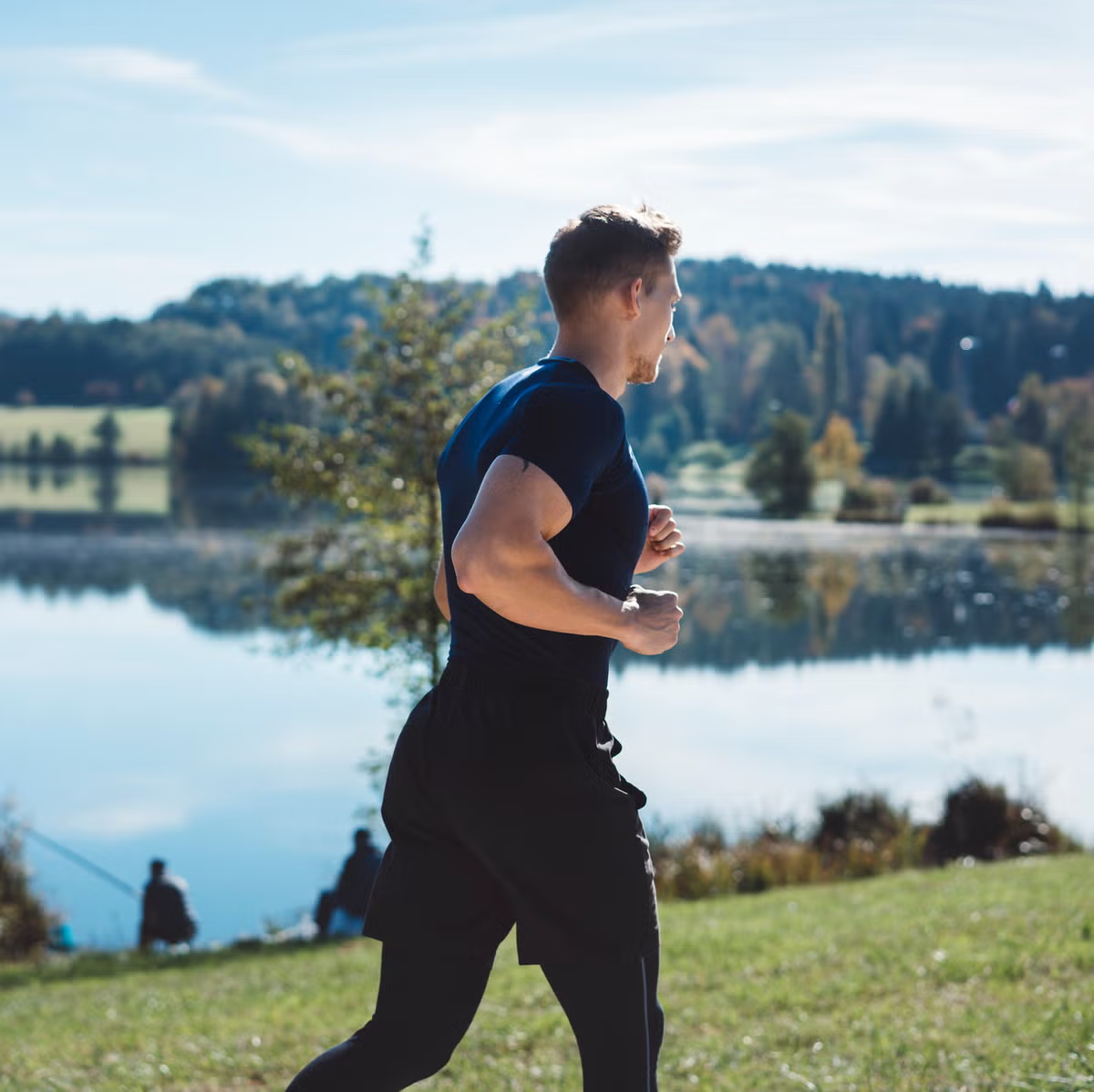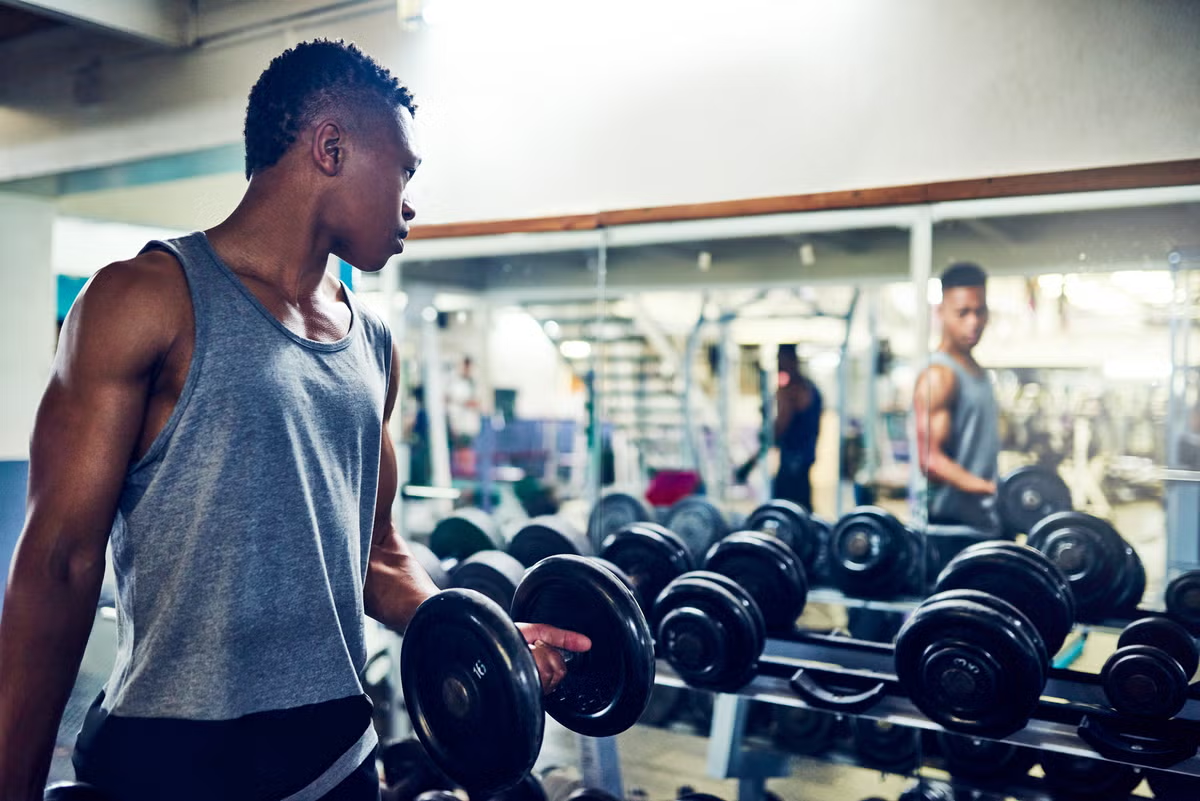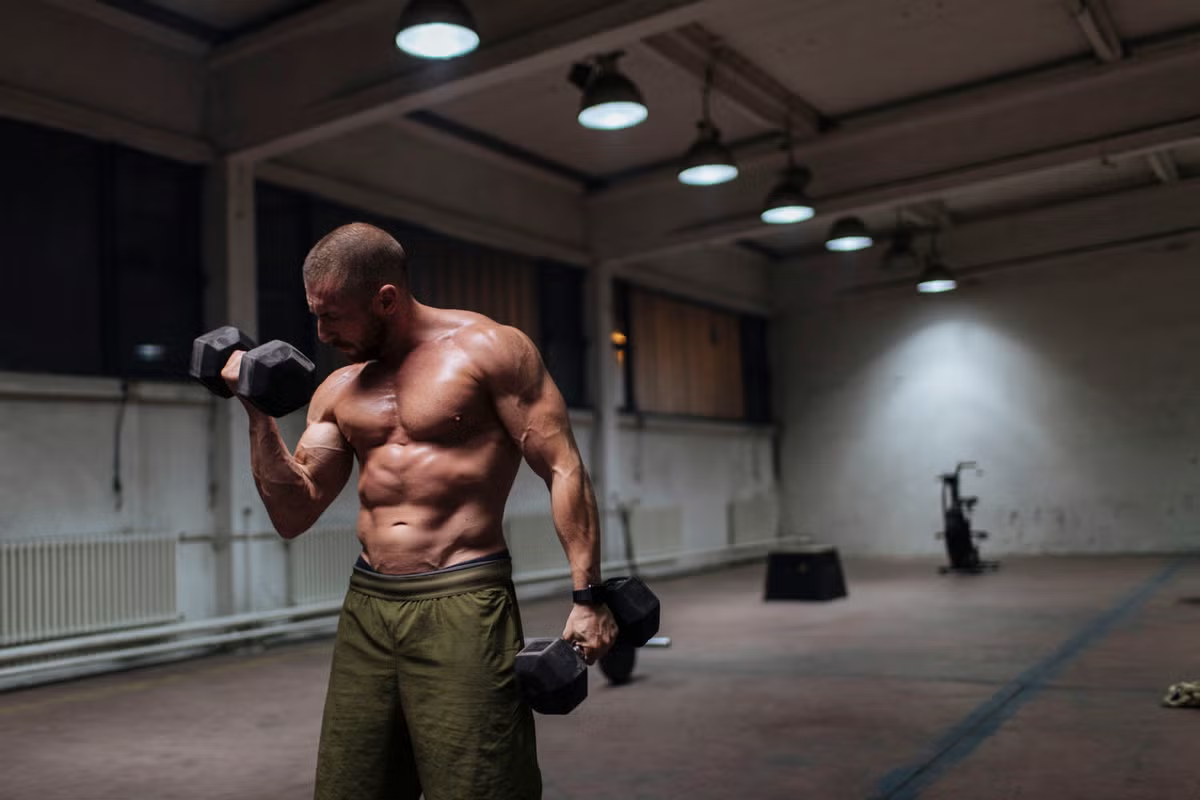LIKE MOST AUSTRALIANS, Jack Robinson grew up nurturing dreams of Olympic glory. Unlike most Australians, Robinson was a child surf prodigy. Possessing a rare blend of otherworldly talent and unrelenting drive, Robinson’s natural skills made his ascendance to surfing’s pro tour inevitable, and a gold medal possible. Yet, during Robinson’s childhood, surfing wasn’t on the Olympic program.
“I’ve always wanted to go to the Olympics,” Robinson told Men’s Health from Red Bull HQ in the Sydney suburb of Alexandria, six months out from his maiden Olympic campaign. “But growing up and having a look at the Olympic sports, none of them were really my thing. I’m not a runner, I’m not swimmer, I’ve always been a surfer, and that wasn’t an option.” Fortunately, that changed in 2021, when surfing became an Olympic sport for the first time.
During surfing’s Olympic debut, Robinson watched on from home as his compatriot, Owen Wright, secured a bronze medal—the first ever Olympic medal to be handed out in surfing. “I watched every second of it,” says Robinson. “I’ve known Owen since I was a little kid and watching him do that was amazing.” That moment lit a fire under Robinson. “It made me want to do the same,” he says.
Robinson is getting his shot at Olympic glory. After three rounds of competition at the Games, he’s endured a crushing, last-second defeat in his opening heat, survived a sudden-death elimination round, and has now upset current world number one John John Florence to advance to the quarterfinal stage, where he’ll matchup against his fellow Australian, Ethan Ewing.
On the day of our interview earlier this year, Robinson was surrounded by other Red Bull athletes, all of them Olympians. Some, flagbearer and five-time medallist Jess Fox on Robinson’s left, had gone through the Olympic process before and knew what to expect. Others, like Robinson himself, were new to this experience. But he’s never been averse to taking on new challenges, or performing under a microscope.
Robinson has grown accustomed to the spotlight. After all, when he first gained international recognition, he was barely a teenager. By age 13, clips of Robinson carving up Pipeline’s infamously hazardous ten-foot swells had gone viral online, and The Weekend Australian had already declared him the next Kelly Slater. By age 14, he was ranked first on Surfer Magazine’s hot 100 juniors list. And by age 16, he’d been crowned a junior world champion.
When he first rose to prominence, Robinson sported a signature bright blonde bowl cut that helped him stand out from the rest of the lineup while out on the waves. Today, Robinson’s hair has faded to a sandy brown. He’s changed in other ways, too. No longer is Robinson the plucky, scrawny kid punching well above his weight. He’s now six feet tall and boasts the surf-honed musculature that can only be achieved through years of hard paddling in the ocean. But despite his changes, Robinson still has the same look in his eyes OF that kid who badly needed a haircut, one that said, I want to be the best in the world at what I do, and I know I can be.
When we asked Robinson if he believes he can become an Olympic champion, he answered faster than one of his signature whipping aerials. “Of course I can,” he replies, marginally insulted by the apparent affront. Don’t confuse Robinson’s self-confidence for arrogance though. He’s been close to his sport’s apex before and knows what it will take to get over the hump. For Robinson, becoming the best in the world isn’t something he strives to achieve, but something he knows will happen.
A tough draw awaits Robinson in the remaining rounds at the Olympics. will face stiff competition at the Olympics. He’s already dispatched the biggest fish in the tournament in John John Florence, but three-time world champion Gabriel Medina remains in contention, along with 2023 WSL tour finalist João Chianca and of course, Robinson’s compatriot Ethan Ewing. It’s a formidable list of competitors, but when I presented a similar one to Robinson in January, he seemed entirely nonplussed. “I’ve already shown I can win events and be among those guys,” he said.
Robinson is unperturbed by the challenges posed by his rivals. He’s had to work harder than most to get to where he is now and has proven time and again that major setbacks won’t stop him from reaching his goals. But to understand the surety of Robinson’s conviction, we need to take a step back in time, because this is my second interview with the surfer, and much has changed since our first.

Red Bull | Ryan Miller
THIS IS THE FIRST TIME Robinson and I have met face to face. The night before our first chat—which took place over Zoom in March of 2023—Robinson had flown home to Perth after a gruelling Red Bull training camp high in the Austrian Alps, where his body was pushed to its physical limits. Under such circumstances, Robinson could be forgiven for blowing off our interview and sleeping in. Which is exactly what he did. On the morning of our Zoom call, Robinson overslept.
Upon joining an empty virtual meeting room, I began to wait, expecting Robinson to join at any moment. But as the minutes ticked by, I began to grow worried. Had Robinson skipped our meeting as some kind of pointed slight? Did he simply not have the time of day for a lowly writer such as myself?
These fears culminated in my sending of an admittedly terse message to Robinson seeping with thinly veiled passive aggression. “Hey Jack, meeting was supposed to be at 11… are we still on for today?” I wrote. My doubts were quickly quelled by an extremely jet-lagged Robinson, who had slept through his various alarms and was awoken by my message, responding with a frantic “Sorry mate! I’ll be on in five minutes.” Besides subduing my regrettably impatient mood, Robinson also proved that despite his freakish talent, he’s still demonstratively human. He’s also one of the most easy-going guys around and immediately forgave me for my insolence.
At the time of that meeting, Robinson was flying high. Fresh off a second-place finish in the 2022 WSL finals, Robinson continued his strong form. And after opening the 2023 season with a victory at the Pipeline Pro, he became the world’s number one surfer, sitting atop the WSL rankings.
Just a few weeks out from the Bells Beach Pro and his home event, the Margaret River Pro—where he would have a chance to defend his title from 2022—Robinson told me he had his sights firmly set on becoming a world champion—and sooner rather than later. However, as is the case in the ever fickle sport of surfing, it only takes a single moment for everything to go wrong.
Less than two weeks after our interview, Robinson injured his meniscus during the Bells Beach Pro. With a noticeable limp hampering his walking ability as he exited the water, Robinson initially downplayed the severity of the injury. Taking to Instagram to dispense of any lingering fears, Robinson wrote “On my last wave I did a layback and my leg turned in a funny angle — I’m resting up, healing and will see everyone at the next comp.”
In reality, the injury was more serious than expected. Robinson had a tear on his meniscus and bone bruising in the surrounding area. Reflecting on the experience, Jack admits he was pushing himself too hard. “I was feeling pretty burnt out at that time,” he says. “I didn’t realise it back then, but I was doing so much and working so hard and everything came to a head.” The original diagnosis called for at least three months of inaction, forcing Robinson to spend an extended period in recovery and to pull out from his pet event, the Margaret River Pro. The diagnosis all but ended Robinson’s shot at a world championship title in 2023.

Red Bull | Tyrone Bradley
In professional sport, the amount of work that goes into recovering from an injury is even greater than regular training and Robinson’s experience was no different. “Every day I was doing recovery work to get the swelling on my knee down,” he says. “I was doing low impact exercises and stretching two or three times a day. I spent a crazy amount of time on the bike and did heaps of stuff with a physio [therapist].”
Try as he might to push through the pain and rejoin the pro tour, recovering took time. “I wanted to go surf Margaret [River] straight up, but I couldn’t even move my knee,” Robinson says. “After about two weeks I felt more mobile and started pushing harder. It felt like I turned into some mythical creature because I was pushing so hard.” Here, Robinson points to Red Bull’s support as critical. “They supported me on the road the whole time. They sent physios and trainers to help me out whenever I needed it.”
Despite initially being ruled out of action for at least three months, Robinson returned to the water just six weeks after his injury—a testament to his unrelenting drive. “A lot of doctors were like ‘no you can’t do that so soon’, but others were saying ‘yeah, you probably could’. I trusted the ones that said I could do it,” he says. Now, Robinson believes the challenge of recovery made him stronger. “I just felt like I had so much power inside of me. I felt like I could push through it and overcome it. Honestly, it was a really good test and something I feel like I had to go through.”
While Robinson’s swift return to the pro tour defied medical explanation, it was clear that he still wasn’t at full strength. After beginning the season with three-straight podium finishes, he was then eliminated in the round of 32 four-straight times following his return. “I’ll be honest, I probably did come back too early,” he admits. “I had about four or five bad events where I wasn’t at my best.”
A quarterfinal appearance at J-Bay in the season’s penultimate event proved that Robinson was still one of the most talented surfers on the tour, even if he wasn’t operating at the peak of his powers. A month later, Robinson punctuated his WSL return with a victory at the Tahiti Pro, catapulting him from eight to fifth in the rankings and securing the last spot in the finals. The victory didn’t come easily. To qualify for the finals, Robinson defeated three-time world champion Gabriel Medina in the Tahiti decider, overtaking the Brazilian in the rankings and nabbing his spot in the finals right out from under him. “Before that I felt like I wasn’t really free with my surfing,” he says. “Winning that last event helped me prove to myself that I was back to normal.”
As fate would have it, the iconic Teahupo’o reef break where the Tahiti Pro was held is precisely where Robinson is surfing at the Olympics. Despite the Games nominally taking place in Paris, the metropolitan capital of France, the city of lights and love doesn’t have much to offer by way of serious swell and beguiling breaks. With no waves to be found in Paris, the inclusion of surfing on the Olympic program necessitated the search for more suitable locations by Games organisers. Eventually, they landed on Teahupo’o, which, as part of French Polynesia, is a French overseas territory, even though it’s more than 15,000 kilometres from Paris.
Robinson told Men’s Health that he’s pleased with the site of the event and feels he has a natural advantage due to his experience there. “I feel like I’ve been there so many times that everything’s familiar,” he says. Tahiti’s distance from France meant Robinson had to miss the Olympics’ opening ceremony. Instead, he spent a few days acclimatising to the conditions in the Pacific, a necessary sacrifice, if you take his word for it. “If the waves are really big at Teahupo’o, there’s nothing that can prepare you other than being there and just getting used to it.”

Red Bull | Ryan Miller
OVER HIS YEARS in the waves, Robinson has developed a tried and tested pre-surf ritual centred around meditation. At pro events, it’s not unusual to witness Robinson parting crowds like Moses with the Red Sea to clear some space for his routine. The whole process makes for quite the showcase. Consequently, television crews and fans typically flock to get a shot of the surfer putting himself through his paces, but Robinson is not concerned with perceived histrionics; he genuinely believes that his routine is crucial for his success.
“I’m just trying to make myself feel as comfortable as possible in those situations,” Robinson says. “There’s so much pressure in these events and I want it to feel as familiar as possible, so keeping with my regular routine really helps with that.”
Robinson meditates daily and his devotion to the ancient practice extends beyond breathing exercises at events. He has a purpose built “meditation station” at home, which he insists is “not as big of a deal as it sounds”. Despite downplaying its grandeur, Robinson uses his meditation station as often as possible. “It’s just a little room I use for some quiet time almost daily. It’s really nice to have a routine, and meditating in the morning can be your anchor for the day,” he says.
At the end of 2023, Robinson became a dad, welcoming his first son, named Zen. “It’s everything and more,” he says. “No one can tell you what to expect and it doesn’t really sink in until it happens. I’m so full of joy at the moment and feeling extremely fulfilled.”
Besides prompting several sleepless nights, Robinson believes becoming a father has resulted in a supreme boost to his mental fortitude. “Everyone laughs at me when I say it, but dad strength is a real thing,” he says. “It makes you value your family and the people you spend time with, and I feel like that’s what we’re really here for. It also makes you reconsider what matters in your life. Things that once seemed so important don’t seem so important anymore.”
I somewhat sarcastically asked Robinson whether he’d started Zen on a training program and had him in the waves yet—half expecting a chuckle and half expecting a disdainful scowl for suggesting such an endeavour. To my surprise, Jack replied without missing a beat, “I already chucked him on Steph’s board last week. I saw her in the car park at the beach recently and he had a go on her board, I got the best little photo.” The owner of the aforementioned board is just ‘Steph’ to top-level surfers like Robinson, but to you and I, that’s Stephanie Gilmore, the most decorated female surfer of all time and an eight-time world champion. It’s safe to say that Zen’s coaching team won’t be lacking in expertise.
As for Zen’s future surfing career, Robinson already has some plans in the works. “He’s gonna be a regular footer I think, but my plan is to make him a goofy and a regular,” he says. “If he can be both, I reckon he’d be the best surfer ever, and that’d be pretty cool.” A reminder, Zen is only a few months old. But with guidance like that, he’s destined to follow in his dad’s footsteps.
Robinson is taking 2024 in his stride. 2023 saw him overcome numerous obstacles and welcome new gifts, both of which he believes have made him stronger. All eyes will be on Robinson in this week, when he gets his chance at claiming Australia’s first ever gold medal in surfing. But his quest to become a world champion and Olympic medallist won’t define his legacy, nor is it keeping him up at night. He knows his time on top will come, so what’s the use in rushing it? “Right now, I’m on my own time and I know what I have to do to reach my goals, but there’s no point in putting too much pressure on myself, it’ll happen when it happens,” he says. I believe him.

Red Bull | Ryan Miller
Related:




